- Site Counter:3,596,351
- Visitors:
- Today:2,141
- This week:15,711
- This month:131,878
- This year:991,026

| Sr No. | Document | Description |
|---|---|---|
| 1 | 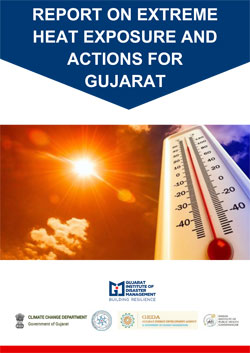 |
Report on Extreme Heat Exposure and Actions for GujaratGujarat Institute of Disaster Management in collaboration with Climate Change Department, IIT Gandhinagar and other associated agencies has prepared a research ‘Report on Extreme Heat Exposure and Actions for Gujarat’ to support the Gujarat State Heat Action Plan, develop District wise threshold-temperature (TT in Celsius) for Early Warning, spread awareness and developing sector wise Standard Operating Procedures (SoPs). Exposure to extreme heat affects health directly, exacerbating underlying conditions such as cardiovascular and respiratory disease, and causing heat stroke, adverse pregnancy outcomes, worsened sleep patterns, poor mental health, and increased injury-related death. Northern India witnessed a new record of average temperature of 36.32 °C, record high since 2010 with 55% rise in deaths due to extreme heat between 2000-2004 and 2017-2021, referred by recent study published in The Lancet, causing to large scale socio-economic losses. The report also highlights the different adaptive measures and the need of intersectoral coordination to create and implement coherent and real time adaptation to reduce extreme heat. Few recommendations have been drawn to be assessed and incorporated in the Heat Action Plan to make it widely useable, comprehensive, and coherent. Year of publication - April, 2023 View |
| 2 | 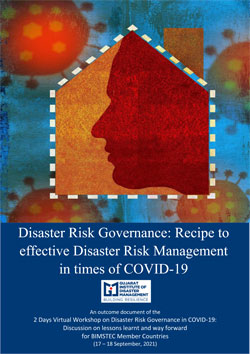 |
Disaster Risk Governance: Recipe to effective Disaster Risk Management in times of COVID-19This document has been developed as an outcome of the 2 days virtual workshop conducted jointly by the Government of India and the Gujarat Institute of Disaster Management for the BIMSTEC Member Countries on the 17th and 18th of September, 2021. In line with the theme of 2020’s International Day for Disaster Risk Reduction (IDDRR) - #ItsAllAboutGovernance - as the world gears up to re-imagine the ‘new normal’ with strategies of resilient recovery and sustainable development, through this virtual workshop the Member States of BIMSTEC came together and discussed the lessons that were learnt. The discussions on disaster risk governance encompassed multi-sectoral, multi-departmental, multi-hazard and trans-disciplinary dialogues so that the experiences can be used to prepare us better for the emergent disaster risks & uncertainties of tomorrow. Year of publication - March, 2022 View |
| 3 | 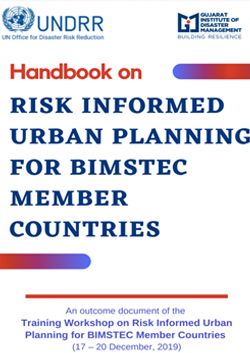 |
Handbook on Risk Informed Urban PlanningThis Handbook, developed as an outcome document of the workshop conducted for BIMSTEC Member Countries at Gujarat Institute of Disaster Management (GIDM), from 17th to 20th December, 2019, is intended to function as a preliminary support guide for the urban planning professionals in the BIMSTEC Member Countries to understand the fundamentals of disaster risk management and how the principles of disaster risk reduction and resilience can be incorporated into urban planning decisions. This Handbook has a simple goal to inspire and motivate apex decision makers in the field of urban planning and development to consider the nuances of disaster risk reduction and disaster risk management in their existing process of planning, governance, financing and development. This Handbook derives its inspiration from UNDRR’s ‘Implementation Guide for Land Use and Urban Planning’ (Words into Action series). Year of publication - May, 2019 View |
| 4 | 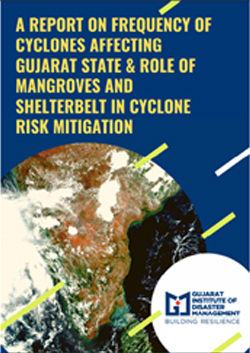 |
A Report on Frequency of Cyclone Affecting Gujarat State and Role of Mangroves & Shelterbelt in Cyclone Risk MitigationThe Report provides brief account of recent patterns of cyclonic events in Arabian Sea and the role mangroves and shelterbelts can play in mitigating cyclone risk. Year of publication - 2020 View |
| 5 | 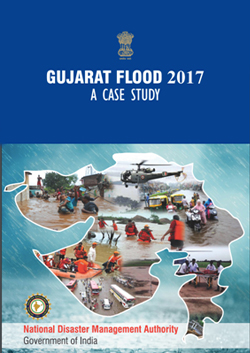 |
Gujarat 2017 Flood – A Case StudyThis study was taken up to document the best practices adopted by Gujarat and the lessons learnt, especially in preventing the outbreak of epidemics in the flood affected areas and the use of drones to supply relief material to stranded persons. This study also highlights long-term measures being undertaken by the State to improve the resilience of its people besides making recommendations for strengthening institutional arrangements towards the same. The study also brings to the fore the need to form empowered committees to take timely decisions on the regulation and release of water from the dams/reservoirs/tanks. In this case, suitable institutional arrangements should also be made between Gujarat and Rajasthan to improve preparedness as the two States share the catchment areas of several rivers. Year of publication - 2017 View |
| 6 | 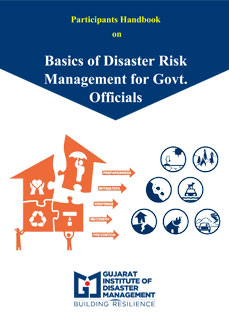 |
Participants Handbook on Basics of Disaster Risk Management for Govt. OfficialsThis handbook is targeted towards the newly recruited probationer/ government officials. This module is designed with a view that the target audience will reap maximum benefits in minimum amount of time and will understand the basics of DRM in a comprehensive manner. The style of delivery, however, may differ depending upon the levels of officials (L1, L2 or L3). A group size of 25 - 30 people would be ideal. This handbook is designed in such a way that the entire content can be covered in a single working day, if done exhaustively, both via online mode or offline mode. Year of publication - 2021 View |
| 7 | 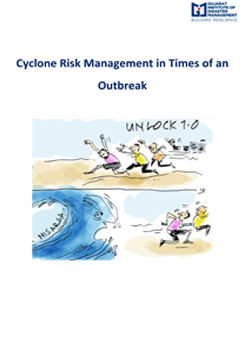 |
Cyclone Risk Management in Times of an OutbreakThe New Normal induced by COVID-19 has instigated the need of redesigning of our conventional preparedness & response strategies to cope with extreme events like Cyclone. While COVID-19 struck mankind with an utter surprise, it is absolutely possible that, in the times to come, we may encounter similar outbreaks or situations which restricts the mobility and thereby impedes the conventional processes of disaster preparedness and response. As it is said, every disaster is an opportunity to learn and the same has been reinforced by the Hon’ble PM’s 10-point agenda, this handout intends to disseminate the experiences gathered by the states which were affected by the cyclones during the period of lockdown. This handout will prove beneficial in making relevant preparedness strategies for tackling future cyclones amid COVID-19 crisis situation which doesn’t seem to fizzle out soon. Year of publication - November, 2021 View |
| 8 | 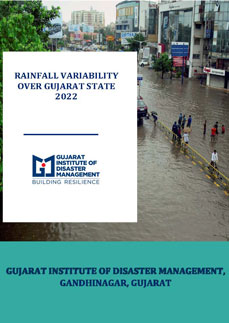 |
Rainfall variability over Gujarat state 2022This report is a comprehensive study on Gujarat 2022 rains, expressing the trajectory of rainfall in Gujarat in the year 2022 and also emphasising the regular rainfall pattern in Gujarat along with the district-wise trends in rainfall in the past decades. Probable factors responsible for this shift and its effects have also been brought to light to get a complete picture of where we are and what ought to be done. Year of publication - 2022 View |